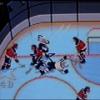
Encouragement for Writers
#1

Posted 07 February 2013 - 12:53 AM
The quote that got me thinking of this:
“What an astonishing thing a book is. It's a flat object made from a tree with flexible parts on which are imprinted lots of funny dark squiggles. But one glance at it and you're inside the mind of another person, maybe somebody dead for thousands of years. Across the millennia, an author is speaking clearly and silently inside your head, directly to you. Writing is perhaps the greatest of human inventions, binding together people who never knew each other, citizens of distant epochs. Books break the shackles of time. A book is proof that humans are capable of working magic.”
― Carl Sagan
#2

Posted 07 February 2013 - 05:03 AM
Through writing without having to be "a writer", I've had an advantage. I don't have the pressure of what I write having to be any good. I save that kind of pressure for illustrating and film work, which will be my career.
One of the best things you can do as a writer (or as an anything) is just do TONS of it. But it's hard to keep putting out work and doing it consistently when we become disappointed with the quality of what we make. That is why I think the first step is to learn how to not worry about the bad. Good or bad, just keep doing it.
Creativity is allowing yourself to make mistakes, Art is knowing which ones to keep (-Scott Adams). But it's not until we have made an infinite amount of mistakes that we can start making anything good. So just get the mistakes out of the way and just keep writing!
Another uplifting creativity quote:
"To live a creative life we must lose our fear of being wrong."
-Joseph C. Pearce
#3

Posted 07 February 2013 - 05:11 AM
"I write fantasy because it's there. I have no other excuse for sitting down for several hours a day indulging my imagination. Daydreaming. Thinking up imaginary people, impossible places. Imagination is the golden-eyed monster that never sleeps. It must be fed; it cannot be ignored. Making it tell the same tale over and over again makes it thin and whining; its scales begin to fall off; its fiery breath becomes a trickle of smoke. It is best fed by reality, an odd died for something nonexistant; there are few details of daily life and its broad range of emotional context that can't be transformed into food for the imagination. It must be visited constantly, or else it begins to become restless and emit strange bellows at embarrasing moments; ignoring it only makes it grow larger and noisier. Content, it dreams awake, and spins the fabric of tales. There is really nothing to be done with such imagery except to use it: in writing, in art. Those who fear imagination condemn it: something childish, they say, something monsterish, misbegotten. Not all of us dream awake. But those of us who do have no choice." -- Patricia A. Mckillip
You haven't experienced the full cofusion of modern gender relations until you've heard an angry group of women yelling, "We want tentacles!" at an all-night Hentai-fest.
-Tonbo
You can find my original fiction, facebook, twitter, and other ways to contact me on my website, FennecFoxPress.com
#4

Posted 20 June 2013 - 03:21 AM
When I first started writing, I sucked at it. Granted, at the time, English wasn't my primary language, so it was understandable.
What really helped me improve was reading.
I was a slow reader, and favored short texts. Now I can read a 32 chapter long book in a day.
But what reading does, is it widens your vocabulary, and your perspective. You learn the dos and don'ts, the techniques etc.
To write something, you have to like the topic; it has to be something that catches your attention. There's a book that literally talked about trash, and because it's so well written, and the reader can 'see' the writer's passion for said topic, the subject 'trash' suddenly becomes fascinating.
My advice is to write what you love, because more ways than not, you'll probably be good at it.
“If you don't have time to read, you don't have the time (or the tools) to write. Simple as that.”
-Stephen King
Edited by Cupcake-chan, 20 June 2013 - 03:22 AM.
#5

Posted 20 June 2013 - 04:51 PM
Heeerrrrmmmm...
In terms of content, I generally write with an objective mindset, researching my intended topics and outlining it to keep my focus towards the point of the story. My researching usually gives me inspiration, allowing me to input more creativity and accuracy of what I wanted to portray. Notes, scrawls, sketches, whatever I draft I eventually redo until I'm satisfied. Sometimes I never reach the final point when it comes to writing because I always overwrite and change because of the new materials I come across in my research. Some may argue that my method is mostly counter-productive, but for me it's a matter of polishing my craft and practice.
Researching inspires me so much. Whether it's about the symbolism of dreams or about how pigs do their thing with their thang, I'm researching not just for the content, but how I could incorporate these newfound knowledge to play around with phrases and words. To liven up my text and not just my story. I want to write like I'm writing the words and not the story. The story is objective, I write what I want down as simple as I can, there is a beginning, a middle, a climax, and an end. But the words I write, they are subjective, to my feelings, to the character's feelings, the flow of the story that transitions the beginning, the middle, climax and end.
My advice is:
To write for yourself and what you want, becomes moot and nonsensical if you never take your words into consideration on how to convey the character and their actions. If you focus more on what you want out of the story and the general plotline, you will lose readers. It's not your idea that drives the story and keeps the readers focus, but the characters that carries the readers along. Give your fictional babies character, personality, distinction, anything that allows the reader to be drawn in and relate. Readers need to know who these characters are, not the intention of what these characters are for and have. ie. A hero is intended to be a hero, a female lead is intended to be a love interest, and etc.
1) "He stripped off his underwear."
But how did he strip off his underwear?
2) "With the intensity of a desperate virgin teenager, he tore off his underwear."
With the power of word play, example 2 speaks more volumes about the stripper than example 1.
"I'm sorry, did I break your concentration? I didn't mean to do that. Please, continue, you were saying something about best intentions. What's the matter? Oh, you were finished! Well, allow me to retort. What does Marsellus Wallace look like?" - Jules Winnfield
#6

Posted 20 June 2013 - 07:58 PM
1) "He stripped off his underwear."
But how did he strip off his underwear?
2) "With the intensity of a desperate virgin teenager, he tore off his underwear."
With the power of word play, example 2 speaks more volumes about the stripper than example 1.
Actually, the first one would work better. The second one uses a metaphor, which should hardly ever be used. This is advice that was given to me by Ellen Gilchrist, National Book Award winner and my professor for my Fiction Workshop class. Being too wordy can be an issue. The first one offers us the how.
He stripped off his underwear.
Stripped is an active verb with a great connotation.
Now if you wanted to say, he tore off his underwear, I would say that. But leaving that metaphor out is good writing sense. Metaphors and similes should hardly ever be used unless they have never been used before.

#7

Posted 20 June 2013 - 11:23 PM
Actually, the first one would work better. The second one uses a metaphor, which should hardly ever be used. This is advice that was given to me by Ellen Gilchrist, National Book Award winner and my professor for my Fiction Workshop class. Being too wordy can be an issue. The first one offers us the how.
He stripped off his underwear.
Stripped is an active verb with a great connotation.
Now if you wanted to say, he tore off his underwear, I would say that. But leaving that metaphor out is good writing sense. Metaphors and similes should hardly ever be used unless they have never been used before.
And...I disagree. The second sentence had impact. It opens up the imagination of the reading audience and paints a clear, vivid image that the first sentence (while nothing is inherently wrong with it) doesn't do.
#8

Posted 21 June 2013 - 12:01 AM
Actually, the first one would work better. The second one uses a metaphor, which should hardly ever be used. This is advice that was given to me by Ellen Gilchrist, National Book Award winner and my professor for my Fiction Workshop class. Being too wordy can be an issue. The first one offers us the how.
He stripped off his underwear.
Stripped is an active verb with a great connotation.
Now if you wanted to say, he tore off his underwear, I would say that. But leaving that metaphor out is good writing sense. Metaphors and similes should hardly ever be used unless they have never been used before.
And...I disagree. The second sentence had impact. It opens up the imagination of the reading audience and paints a clear, vivid image that the first sentence (while nothing is inherently wrong with it) doesn't do.
I... Either approach when it comes to writing have their own merits when it comes to conveying? I totally get what Greed is saying, since that was one of the basics I was taught in one of my Lit. Classes. Simple is the more concise approach, as it gets the point across without clutter. Especially when it comes to writing thesis essays, but Sakura Blossoms basically made the point I was trying to say. About impact and stuff...
When I wrote my post down, I was basically recalling a certain narusaku fanfic I came across. Where the idea was totally brilliant and my cup of tea, but that interest slowly died due to the way the author progressed the story so... uh... unmoving?
"He stripped off his underwear" can get rather cliche or overdone when its the same thing written over and over again (in that exact way). Not... that I read stories about men stripping off their undergarments to the point of redundancy... Just gimme some different flavours of cookies ![]()
Actually there should be some sort of narusaku drabble about the different ways Naruto would strip off his underwear for Sakura ![]()
But yeah, too much wordy phrases can be cluttering, but too little isn't very... impacting. So there's gotta be a balance for both ways? Right? Amirite? Guys? The underwear drabble totally a thing now yeah?
Edited by Pocky-chan, 21 June 2013 - 12:04 AM.
#9

Posted 21 June 2013 - 12:22 AM
My point was...and I wasn't talking about essays of any sort, since I normally write fluffier with essays. My point was that metaphors and smilies are cliches that are hardly ever fresh. While the point of the author is to paint a clear, vivid description of the scene, it should be done in a manner that is simple. Authors use these long complicated sentences when sometimes a simple, concise sentence is all it needs.
Two different ways of writing:
Naruto slid his underwear down. Past his knees. Past his shins. He pulled one leg out, and then the other. He smirked at the expression on Sakura's face. She held a look of curiosity and apprehension - brow furrowed, eyes darting away every couple of milliseconds. Cute.
But you can make clear, concise sentences still carry detail. In fact. Short sentences can carry pacing with it a lot better. Yeah, I'm looking at you Hawthorne >.>

#10

Posted 23 June 2013 - 02:14 AM
And...I disagree. The second sentence had impact. It opens up the imagination of the reading audience and paints a clear, vivid image that the first sentence (while nothing is inherently wrong with it) doesn't do.
Verbosity is hardly required for descriptive writing. The second sentence didn't open up the imagination of the reader, it did the opposite. It gave so much superfluous information that it left the reader's imagination no room. Besides, stringing together a lengthy, adjective ridden sentence is no challenge to an author. It is easy to add words, but try to convey the mood, attitude, and action in as small a sentence as possible is an author's true test of skill.
I'll use Hemingway as an example. You'll never experience writing as 'curt' as his and yet I've also never experienced such a strong atmosphere and voice in fiction than when reading Hemingway.
It is naive to think the author's only tools are words and sentences.
#11

Posted 23 June 2013 - 08:43 AM
It is naive to think the author's only tools are words and sentences.
There's no naivety here. I've been a writer for more than half my life. I'm well aware of the fact that a writer/author has more tools at their disposal than just words and sentences ![]()
#12

Posted 23 June 2013 - 05:36 PM
you're right that comment was rash, sorry. I stand by the rest.
#13

Posted 23 June 2013 - 07:34 PM
Verbosity is hardly required for descriptive writing. The second sentence didn't open up the imagination of the reader, it did the opposite. It gave so much superfluous information that it left the reader's imagination no room.
I also hail from the school of "less is more." I'm particularly sensitive to what you've said here about leaving room for the reader's imagination. As a reader, I personally do not enjoy detailed descriptions that attempt to lead me to a specific vision or interpretation.
Descriptions of physical space or other tangibles might, in general, require a bit more detail to set the scene for the mind's eye, but as powerful as the right words are they are still no match for the power of my imagination to fill in the gaps.
With regard to the two sentences above, I have my own perceptions of Naruto and what his feelings about intimacy with Sakura might be. I don't like the descriptive sentence at all because it robs me of the opportunity to imagine his actions and behavior for myself. Instead I am force-fed the notion that he is a "desperate virgin" which brings with it emotional implications that may be at odds with my interpretation of his character. Why impose that on a reader when it is not needed to understand the context?
It's my opinion that restricting the amount of overt and unnecessary description allows readers more room to engage. As a writer, that's what I would want -- that as much as possible, each reader is able to tailor the experience to what suits them.
Of course, all of this is easy to say but difficult to put into practice. My own writing remains flawed and subject to common pitfalls. Like my stories, my training is a constant work in progress.
As it is with art, music, dance or really any creative effort, preferences in literature are based as much if not more on style than content. Some readers prefer very detailed descriptions and are attracted to writers who prefer to write in a detailed way. Conversely, some readers prefer less and gravitate toward writers with tidier, more compact prose. There's lots of variety, and the way I see it everybody wins.
#14

Posted 24 June 2013 - 12:34 AM
KnS, well put. I admire your writing very much by the way.
well I think this discussion is an important one since it really applies to so many types of creation. I've been studying illustration and the same things can be said about leaving room for the viewer's imagination in a painting. My instructors are always saying that each paint stroke or pencil mark has to be a conscious decision--"do I need a line here to make the composition flow? Do I need a stroke of red here to get the viewer's attention?" If it isn't needed, and you instead leave some breathing room, then the viewer's brain knows to fill things in and fill it in way better than I could ever hope to paint.
I try to keep this in mind by thinking about John Singer Sargent. Sargent was famous for spending hours just trying to get a single brush stroke right. He would make a stroke, then scrape the paint off if it wasn't perfect. So he wouldn't actually put much detail in but made sure that every brush stroke he did include was perfect and would give the most information. The end result was he could make an exquisit painting that still appeared free and loose.
Edit: let's get back to a more encouraging tone here with some good quotes
"All good books have one thing in common - they are truer than if they had really happend." - Earnest Hemingway
Here is just a generally uplifting one, "Everybody is a genius. But if you judge a fish by its ability to climb a tree, it will live its whole life believing that it is stupid." - Albert Einstein
Edited by jworks, 24 June 2013 - 06:42 AM.
1 user(s) are reading this topic
0 members, 1 guests, 0 anonymous users



















